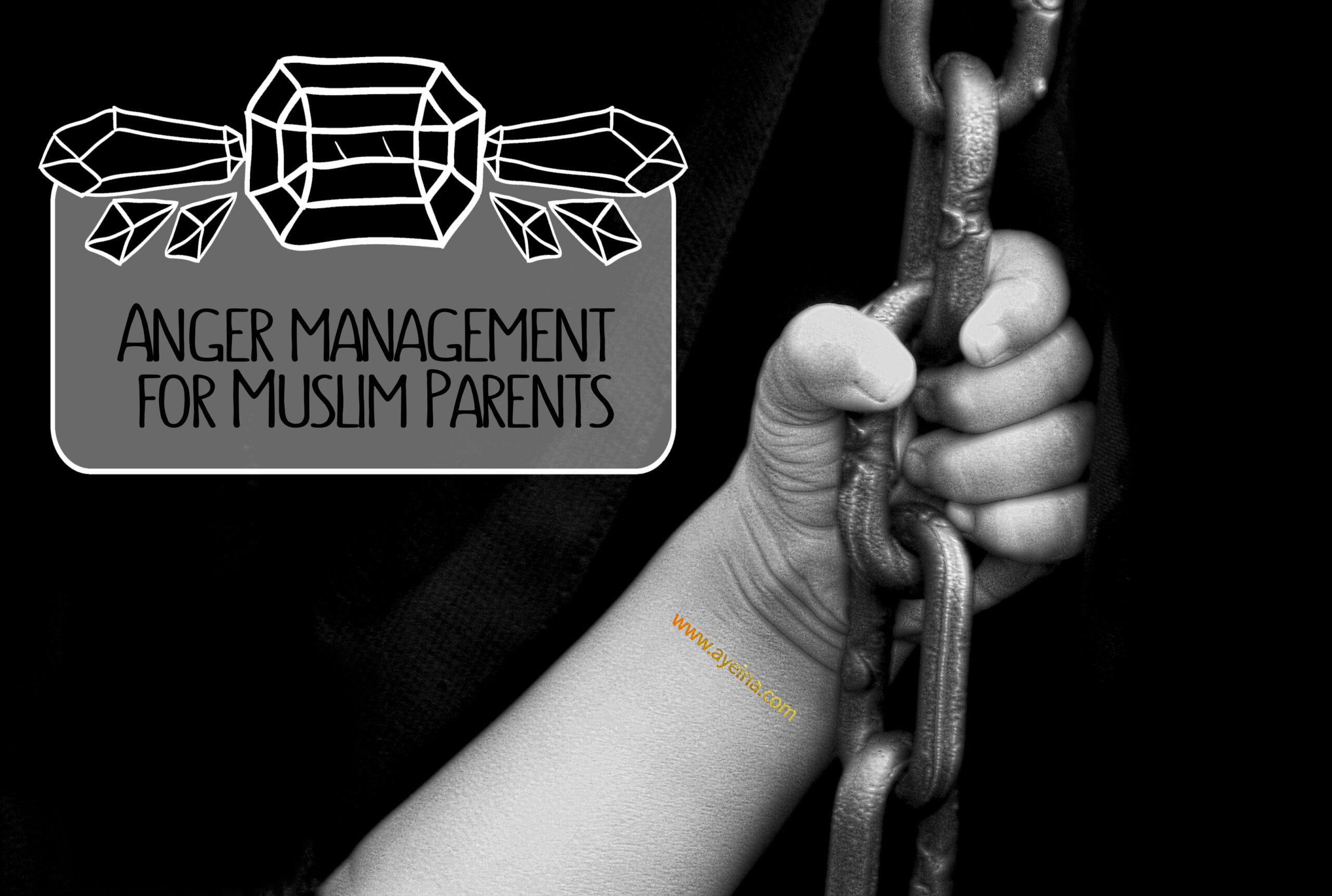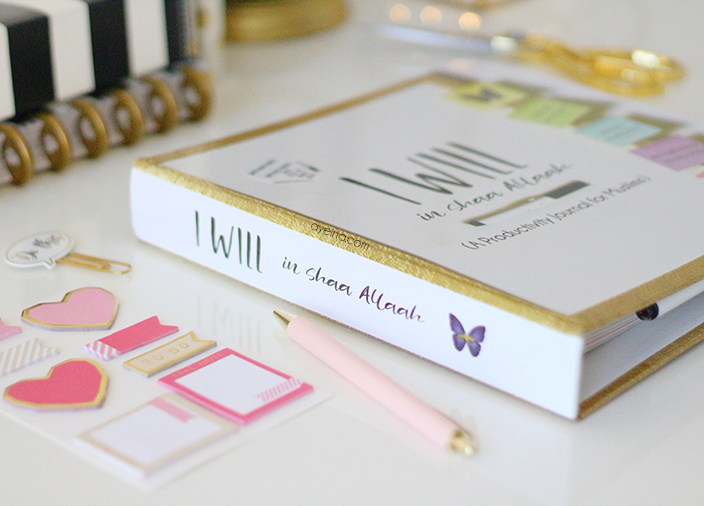Last updated: January 2020
Anger management through Qur’an and Sunnah (practical tips)
———————————————————————————————
“…And had you been severe and harsh-hearted, they would have broken away from about you; so pass over (their faults), and ask (Allah’s) Forgiveness for them…” [Quran – 3:159]
We don’t see and hear ourselves when we are angry, especially when dealing with our kids. We shout, scream, and say things that are considered very mean in an adult world. Verbal bullets are shot and kids are left wounded.
I don’t realize the intensity of my behavior until I see someone else doing the same, and immediately I find myself in them. I realize the severity of my rage when I hear mothers shouting at the top of their voices. I can hear them despite the fact that we don’t share the same house. And every time it happens, the first image that pops into my head is…Myself! So I would like to highlight a few important points (reminding myself first, because I need them day in and day out as much as you):
1: Think of your children as Allah’s amaanah instead of your own property
Controlling anger as a parent is hard when deep down inside you feel like you own these children because you gave birth to them. You see, we don’t even own ourselves, let alone our kids. We all are Allah’s amaanah and so are they!
Kids are hardly responsible for our meltdown – they simply tend to pay a price for what we are unable to handle within ourselves. Think of it like – Allah gave you His creation so you can beautify it and return it to Him when the time comes. So are you going to return His amaanah in a damaged form? When we constantly yell, kids may end up having a lower self-esteem and confidence. They may end up being aggressive. Or they may constantly stay in the state of fear. Alternatively, when a child is constantly yelled at, he/she can learn to “zone out” as a form of self-defense which may result in lack of concentration in other areas of life too – which may render your yelling ineffective (and that may trigger your anger even more – which means you may end up hitting them as a result). Yelling is not only harmful for kids, but is harmful for our own souls – not just our aakhirah, but also our dunya. Just recall the last time you yelled and how you felt afterwards…
2: Know your triggers and work on the underlying issues
Try to shift your attention from your child to your inner state. Under your anger is sometimes fear, sadness, or disappointment. Let all that well up, and just breathe. Let the tears come if they need to. Be kind to yourself. Once you let yourself feel what’s under the anger–without taking action–the anger will begin to melt away. When you feel stressed, and overwhelmed, your pre-frontal cortex – the rational, reasoning part of your brain that is responsible for impulse control can’t function as well as it does in calmer times. Sometimes unconscious memories from your own childhood may get triggered, and you may start acting in ways that are similar to the ways you were treated when you were young. So parent yourself first with the compassion you may have required at that time. That means learning to coach yourself lovingly through your own emotions, so you don’t take them out on your children. The more you stop and reflect, the better you become at noticing your emotions which helps you to work towards preventing them from reaching the stage of anger. Once you know your triggers, try to stay away from them and when you see yourself getting triggered, take a step back instead of testing yourself whether you can calm the storm amidst chaos or no.
…Prophet (ﷺ) said, “A judge should not judge between two persons while he is in an angry mood.” [Bukhari 7158]
3: Understand their brain development so you have age-appropriate expectations:
If you expect kids to act like adults, you’ll be disappointed over and over. Learn all you can about child development. You might find out that your child keeps returning to the same thing you said no to, because developmentally, children are born curious. Knowing how their brains work can help you to be more accepting and less angry as you won’t be taking it personal. For kids, their higher brain isn’t even working. But for an adult, they are fully functioning – yet we choose to shut it down in the face of emotions and come down to their level. When we yell, we come down from our higher brain to the middle brain too. When our kids are young, they don’t have enough brain development to be able to consistently maintain an emotional balance. It means that it’s much more important to maintain our emotional balance to support our children in regaining their balance. A tantrum or a meltdown is an unmet need – a need of affection. Need of empathy. Need of attention. And kids don’t have the skills or vocabulary to share the information of their emotions and feelings. Which can lead to frustration for both parties. So it’s important to practice what you preach because kids see, kids do!
Many times we accuse our children of mistakes without confirming or making sure they actually made the mistake. We make hasty accusations and punish them, clouded by our own emotional state at that moment, only to soon realize that we were the ones mistaken. If we do fall into this situation, we should teach them conflict resolution by apologizing for our mistake.
4: Remember that YOU are accountable to Allah as an adult and they are not (if they haven’t hit puberty yet)
Treat them with the kindness you would treat an adult with. When we shout so loud that the neighbors can hear it, it will hardly enter a kid’s heart, mind, or even soul. A firm tone is enough with the proper choice of words. Being harsh towards children is against our human nature and religion. Parents are the first role models for their kids. They look up to them in times of distress and confusion. If we fail to give them comfort, they will seclude themselves and find refuge somewhere else — be it right or wrong. Turn away from your child physically and take a deep breath to remind yourself that your anger will only make things worse. How many times have you yelled at your toddler for not crying and they actually started crying more? Your toddler will not be accountable to Allah for his/her deeds, but you ARE as a grown-up!
Messenger of Allah ﷺ said: “He is not one of us who shows no mercy to younger ones and does not acknowledge the honour due to our elders”. [Riyad as-Salihin]
5: Get some rest or ask for help and slow down
If you find that you are constantly annoyed even when kids talk to you normally (they aren’t throwing tantrums or anything), it means that you are exhausted beyond your capacity. It’s a signal that you need some time off or it’s time to let someone help you out. If you can’t afford help and you have no community around you, it’s time to cut off unnecessary things in your life that you are trying to catch up on and getting frustrated as a result of failure in doing everything. You can let go of keeping the house clean 24/7 (and then declutter as much as you can later on – when you have the energy – the less you have, the less overwhelmed you’ll feel in shaa Allah). You can take a nap while putting the kids somewhere safe or simply even lie down (you may wake up to a hurricane – been there done that – but when you are well rested, you’ll be able to face the challenges that comes with parenthood much easily in shaa Allah). You can cut down on your own media consumption – social media/ TV dramas/ Movies – whatever it is that takes your free time away from you. You can make simple meals and let kids have raw veggies or fruits at lunch time etc. (they will grow up just fine with simple food too. But with emotional damage that your anger can leave on them day in and day out, can have a lifetime effect).
Messenger of Allah ﷺ said: “Allah is gentle, likes gentleness, and gives for gentleness what he does not give for harshness.” [Sunan Abi Dawud 4807]
If you think that your severe exhaustion doesn’t go away even with rest, then it’s time to see whether you have any medical condition that’s contributing to your exhaustion – it could be anemia, depression, hypothyroidism etc. Please note that sometimes physical pain can lead to mental exertion (and vice versa) so if there is no said medical condition, then it’s time to change your health lifestyle and perhaps start exercising to build up your stamina.
6: Try sunnah of controlling anger
Try practical sunnah tips like – seeking refuge with Allah from satan, sitting down if standing and lying down if sitting, being silent etc. You become more conscious of your actions and feelings, which helps you self regulate and calm your body better. Read THIS ARTICLE for more tips from the Quran and Sunnah.
Disengage yourself. Remove yourself temporarily from the heated situation. Instead of screaming get out my sight at your kid, take an intentional pause and leave the room. Re-enter when you have better control over your actions and emotions.
Messenger of Allah (ﷺ) said: “Do not invoke curse on yourselves, and do not invoke curse on your children, and do not invoke curse on your servants, and do not invoke curse on your property, lest you happen to do it at a time when Allah is asked for something and grants your request.” [Abi Dawud 1532]
Out of all your duas, if the one you made in anger gets accepted, how would you feel? Would you REALLY like to see your child suffering their whole life? or is it just a spur of the moment?
7: Pick your battles and practice power in other areas of life:
Set up your basic values and keep everything else negotiable. It shows that you’re flexible around your values. And it gives values a strong hold. If you’ll always use power to control kids, you’ll never know how to influence. The idea is to get kids to listen without having to show power and rage. We aren’t safe place anymore if they can’t trust their emotions with us. Ask yourself: Do I want my influence in power? Or do I want my influence in love?
`Aisha said, “The Jews came to the Prophet (ﷺ) and said to him, “As-Samu ‘Alaika (i.e., Death be upon you).” He replied, ‘The same on you.’ ” `Aisha said to them, “Death be upon you, and may Allah curse you and shower His wrath upon you!” Allah’s Messenger (ﷺ) I said, “Be gentle and calm, O `Aisha! Be gentle and beware of being harsh and of saying evil things.” She said, “Didn’t you hear what they said?” He said, “Didn’t you hear what I replied (to them)? have returned their statement to them, and my invocation against them will be accepted but theirs against me will not be accepted.” [Sahih al-Bukhari 6401]
Anger and yelling always comes from a feeling of powerlessness. Powerlessness that you can’t control your kids behavior or life. You may feel powerless because some days you feel like you’re failing at parenting, and you genuinely want to fix it, but you don’t know how to. You give and give and give, and yet, nothing seems to move in the direction you want. So an easy way to feel power quickly is to…yell. It’s the same reason kids talk back, rebel and disrespect. They feel powerless, too. So in that moment, think of the things you CAN control. This simple exercise may allow you to step out of your emotional brain and back into your logical brain. You may slowly move from a feeling of powerlessness to a feeling of control. For eg: I CAN take deep breaths. I CAN choose silence. I CAN say aoodhubillah. I CAN change my position or go into another room. I CAN control my emotions. I CAN defeat shaitaan.
8: Make dua for yourself like you make dua for your kids
I love that mums make so much dua for their kids. But I hope that they remember to make dua for themselves too because they will see the effect of this self care on their children as well.
I remember walking during my labour and constantly saying “Rabbi yassir” (my Lord! Make it easy). It was short hence I was able to repeat it even during strong contractions. I stuck with something short that I desperately needed at that time.
Now after birth, my go-to parenting dua is:
رَبَّنَا أَفْرِغْ عَلَيْنَا صَبْرًا
“…Our Lord, pour upon us patience…” [Quran – 7:126]
Every time my 1yr old makes a mess (draws on the walls or bed sheets (or even clothes), spills all the salt and spices, unwraps all the laundry I just folded, empties out the shampoo bottle (all true stories) etc.), I take a deep breath, go away from that place, recite this dua and return to tackle the situation. After I am calm, I try to show her how we can rectify our mistake, because not getting angry doesn’t mean that we can’t set boundaries for kids. For eg: If my 1yr old spills something, I ask her to bring a cloth (that we have hung in a place where she can reach) to wipe. Then she tries to clean it up (basically spreads it more :p but that’s how they learn bit by bit). Then I say “jazakillah khair” to her (also reminding myself that efforts matter to Allah and they should matter to me as well).
Some days I want to shout if I’m on the verge myself – so if I REALLY feel the need to verbalize my anger – I simply say “Allahu akbar” out loud! (I learnt this from the daughter of Dr. Farhat Hashmi who used to say “Allahu akbar” whenever her boys would make a lot of noise or run around etc.). My 4yr old says the same when her 1yr old sister does something naughty – which makes me realize that how I deal with one child doesn’t only impact them, but also the other kids who are watching it all. Also, my 1yr old has started saying “Allaaaa abbaaa” (Allahu akbar) whenever she realizes she has done something she shouldn’t have. They also need to learn how to regulate their emotions and how I regulate mine has a huge impact. They’re watching what we do to calm ourselves down, and this is what they will do when they get angry themselves in shaa Allah.
9: Remember the reward of patience
The hadith on teaching kids to pray clearly teaches us to remind continuously with love for five times a day for 3 whole years— approximately 5475 times! Do we have the capacity to be patient more than 5475 times over a simple matter? Do we teach with love? Is our frustration more important than the value and command of Allah? May Allah make us those He loves – The patient ones.
And those who say, “Our Lord, grant us from among our wives and offspring comfort to our eyes and make us an example for the righteous.” Those will be awarded the Chamber for what they patiently endured, and they will be received therein with greetings and peace. Abiding eternally therein. Good is the settlement and residence. [Quran; 25:74-76]
10: Rectify your mistakes and forgive yourself
If you end up shouting, you may slowly feel the rage subside and embarrassment filling up that space…But it’s important to rectify your mistake instead of going with the flow because you think that it’s too late now…
It was narrated that ‘Ammar bin Yasir said: “Aishah dropped a necklace and stayed behind to look for it. Abu Bakr went to ‘Aishah and got angry with her for keeping the people waiting. Then Allah revealed the concession allowing dry ablution, so we wiped our arms up to the shoulders. Abu Bakr went to ‘Aishah and said: ‘I did not know that you are blessed.'” [Ibn Majah]
If you’ve become angry with your kids (like Abu Bakr (RA) naturally did with Aishah (RA)), you can admit your mistake and let go of the anger by replacing it with something better. In the example above, Abu Bakr (RA) admits that he did not realize that the incident (caused by Aishah (RA)) was a blessing in disguise, so he became angry. Similarly, you can admit to your child that you were unable to think through at that moment and show them how to resolve conflicts positively. You can apologize and tell them that as human beings, we all make mistakes, but it’s important to take responsibility, repent and make amends. Ask them to remind you to say “aoodhubillah” next time around (and beware! They WILL remind you and it MAY make you more angry :p (been there, done that), but it WILL calm you down soon after then in shaa Allah).
Remember that kids are much more forgiving towards us than we are towards ourselves. If you do not forgive yourself, the shame you carry will compel you to continue to act in harmful ways toward others and yourself. If you have set an unrealistic set of rules for yourself, they will most likely get broken which can then lead to failure. Failure will lead to guilt and the cycle then keeps turning. Without the burden of self-hatred you have been carrying around, you can heal your soul by realizing that your past is in the past. You need to accept that what’s done is done and that there is nothing you can do about that. You don’t have to drag your mistakes back into today. Or carry it into tomorrow. And another day. Another week. Another month. Another year. That pain or mistake is often so brief. But dragging it along with us every where is a choice we make every single day. Use the mistake as a stepping stone to start again in shaa Allah.
*Please note that if you frequently struggle with your anger, seek counseling. There’s no shame in asking for help. The shame is in damaging Allah’s amaanah physically or psychologically.






Needed to read this today! It’s so easy to get angry and end up shouting but children are here for us to take care of and we should not raise our voices.
Yes it can be hard if you are overworked and get no help from your husband, but then that is our test…..and if we end up screaming and shouting we are pretty much failing.
Yes, all us ladies gotta work on this! Its very very hard but worth it!
This is such an excellent reminder. It’s so so easy to end up losing your cool completely and when you reflect on it later – shouting is completely pointless as all they learn is to communicate that way in return!
Subhanallah, you are sooo right. It’s easy to let our emotions overcome us and drive us into thinking the young ones under our care belong to us – to control and manipulate as we wish. While we all belong to Allah and they are only an Amanah. And this issue is relevant to parents, educators and other adult carers.
As shepherds and the best example for the young ones, we need to learn the Seerah and take our example from the prophet as he dealt with children. The most important thing to remember is that they will ultimately learn from the adults from their lives. So let’s make it a worthy example.
jazakAllah for the reminder which is always in need.
opting for shouting and corporal punishment should be taken as a failure on the part of the mother but sometimes is the only last resort.
well, we should make every effort to pray,to ask ALLAH(SWT) for the guidance to be a winning mother.
Ameen.
Beautiful much needed reminder. Jaza-kaAllah khair 💕
Beautiful article sister, Allahumma baarik! The last line about ‘there is shame in damaging Allah’s amaanah’ pricked my eyes with tears. To remember that they’re not ours but entrusted from the Lord of the Worlds. May Allah pour patience on us and allow us to grow in regulating ourselves, so we pass on healthy emotional patterns to them. Ameen. And yup re self-forgiveness. Jazakillahu khairan, sis xxx
Jzk for dis…May Allah grant you jannatul firdausi